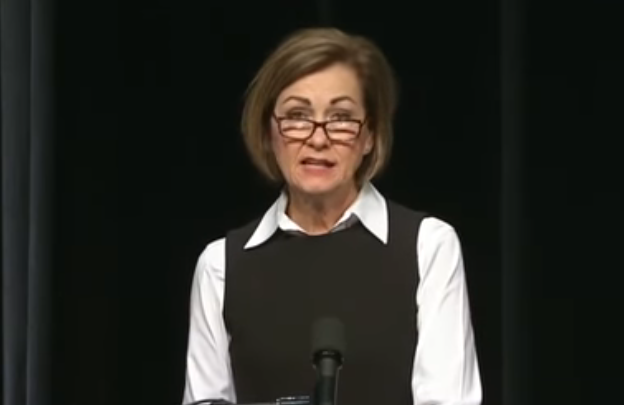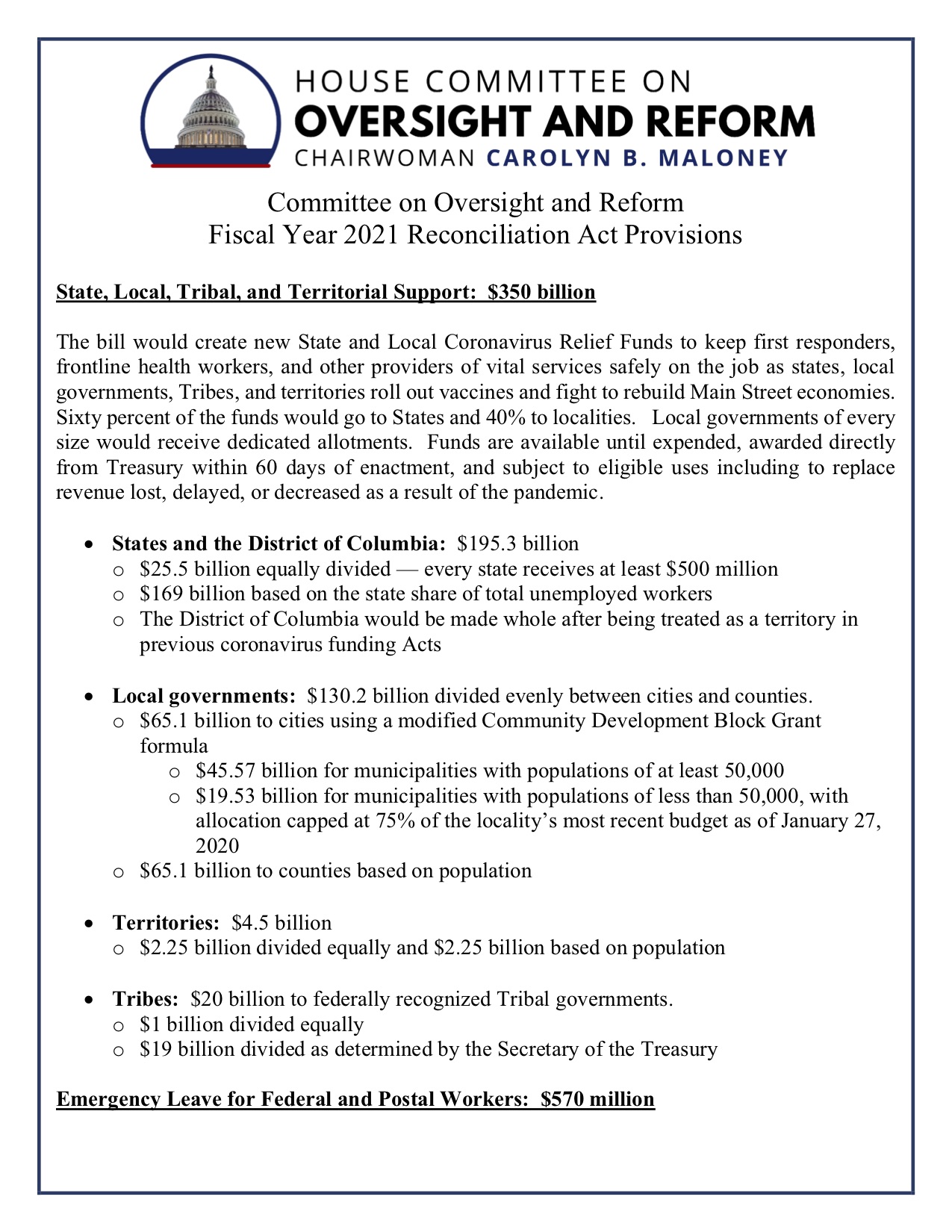Governor Kim Reynolds and 21 of her Republican counterparts complained on February 27 that the latest Democratic COVID-19 relief package “punishes” their states.
It’s a strange take on a bill that would provide $350 billion to state and local governments across the country, including more than $2.5 billion to Iowa. In contrast, a smaller coronavirus response proposal from Republican members of Congress would allocate zero new dollars to state and local governments.
Voting mostly along party lines, the U.S. House approved the $1.9 trillion American Rescue Plan Act in the early hours of February 27. Democrats in the U.S. Senate are expected to approve most of the package, minus a minimum wage increase that can’t be included in a budget reconciliation bill, according to the Senate parliamentarian.
The House Oversight and Reform Committee explained earlier this month that 60 percent of the $350 billion would go to states and 40 percent to localities. That $195.3 billion for states breaks down as follows: $500 million for every state and the District of Columbia ($25.5 billion total), plus “$169 billion based on the state share of total unemployed workers.”
Another $65.1 billion would go to counties based on population, and $65.1 billion would go to cities “using a modified Community Development Block Grant formula.”
A downloadable spreadsheet on the committee’s website indicated that Iowa’s state government would receive $1.39 billion for the new Coronavirus Relief Fund. Iowa counties would receive another $612 million, metro cities would receive $335 million, and smaller municipalities would receive $216 million.
A $600 million plan that ten Republican senators offered for President Joe Biden’s consideration earlier this month would have given nothing to state and local governments.
Reynolds would have almost unchecked authority to allocate the state’s $1.39 billion share from the American Rescue Plan, since the Republican-controlled Iowa House and Senate declined last year to approve any oversight process for federal COVID-19 relief funding.
Instead of hailing the latest Congressional action, the statement from Reynolds and other GOP governors objected,
“Unlike all previous federal funding packages, the new stimulus proposal allocates aid based on a state’s unemployed population rather than its actual population, which punishes states that took a measured approach to the pandemic and entered the crisis with healthy state budgets and strong economies.
“A state’s ability to keep businesses open and people employed should not be a penalizing factor when distributing funds. If Congress is going to provide aid to states, it should be on an equitable population basis.”
The governors don’t acknowledge that every state, no matter how small, is on track to receive $500 million in the latest package–a formula that benefits lower-population states.
Furthermore, while the governors claim their “measured approach to the pandemic” helped “keep businesses open and people employed,” the reality is more complicated.
Republicans like to attribute Iowa’s budget condition and relatively low unemployment rates to the lax COVID-19 mitigation policies Reynolds prefers. However, the Council of State Governments found last year that Iowa fared better than most states in terms of budget shortfalls in large part because of the structure of our economy. States heavily dependent on natural resources or tourism saw “catastrophic” revenue declines. In contrast, Iowa and Delaware benefited from “industry-specific mitigation factors, […] with relatively high concentration of state GDP in the finance and insurance sector and a low concentration in the leisure and hospitality sector.”
The GOP governors’ news release did not clarify whether the governors would prefer the American Rescue Plan as currently drafted or the Republican senators’ plan, which excludes another round of local and state government aid. Asked whether Reynolds is encouraging Iowa Senators Chuck Grassley and Joni Ernst to vote against the COVID-19 relief bill, the governor’s spokesperson did not respond to Bleeding Heartland’s inquiry.
UPDATE: Republicans on the House Budget Committee released this chart indicating that if the $350 billion were distributed solely on a population basis, Iowa’s state and local governments would receive an additional $734 billion.
That’s a significant number, but remember: if Congressional Republicans had their way, states would be getting no new money to support government operations.
Several commenters pointed out that when it comes to Iowa school funding, Reynolds and GOP state lawmakers rejected an equal population approach, preferring to reward some school districts and punish others based on how they approached the pandemic.
Full text of February 27 joint news release from 22 governors including Iowa’s Kim Reynolds:
22 Governors Oppose Biased Fund Allocation in Stimulus Package
DES MOINES – Twenty-two governors have released a joint statement opposing the new standard in President Joe Biden’s stimulus bill for how federal funds would be allocated to states:
“Unlike all previous federal funding packages, the new stimulus proposal allocates aid based on a state’s unemployed population rather than its actual population, which punishes states that took a measured approach to the pandemic and entered the crisis with healthy state budgets and strong economies.
“A state’s ability to keep businesses open and people employed should not be a penalizing factor when distributing funds. If Congress is going to provide aid to states, it should be on an equitable population basis.”
Governors who joined the statement include Kay Ivey (R-AL), Mike Dunleavy (R-AK), Doug Ducey (R-AZ), Ron DeSantis (R-FL), Brian Kemp (R-GA), Brad Little (R-ID), Eric Holcomb (R-IN), Kim Reynolds (R-IA), Laura Kelly (D-KS), Tate Reeves (R-MS), Mike Parson (R-MO), Greg Gianforte (R-MT), Pete Ricketts (R-NE), Chris Sununu (R-NH), Doug Burgum (R-ND), Mike DeWine (R-OH), Kevin Stitt (R-OK), Henry McMaster (R-SC), Kristi Noem (R-SD), Bill Lee (R-TN), Spencer Cox (R-UT) and Mark Gordon (R-WY).
The 33 states expected to lose funding under this proposal, which was adopted by the U.S. House of Representatives this morning, include the following:
* Alabama
* Alaska
* Arkansas
* Delaware
* Florida
* Georgia
* Idaho
* Indiana
* Iowa
* Kansas
* Kentucky
* Maine
* Minnesota
* Mississippi
* Missouri
* Montana
* Nebraska
* New Hampshire
* North Carolina
* North Dakota
* Ohio
* Oklahoma
* Oregon
* South Carolina
* South Dakota
* Tennessee
* Utah
* Vermont
* Virginia
* Washington
* West Virginia
* Wisconsin
* Wyoming
One-page fact sheet explaining the allocation of COVID-19 relief funds to state and local governments.
Top image: Screenshot from Governor Kim Reynolds’ February 25 news conference.


